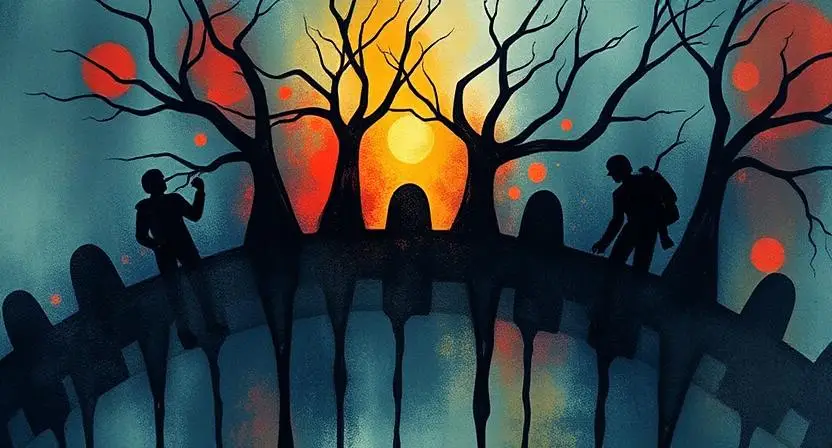Unconscious trauma, often invisible to the individual and society, can have profound effects on emotional and mental health. It refers to psychological injuries that are buried beneath conscious awareness, often due to cultural and societal influences that shape how we experience and process traumatic events. The role of culture and society in unconscious trauma is significant, as cultural norms, societal expectations, and historical contexts can dictate how trauma is expressed, suppressed, or even ignored. This article explores how unconscious trauma is influenced by culture and society, examining the interplay between the two and offering insights on healing approaches that are culturally sensitive and effective.
Understanding Unconscious Trauma: A Cultural and Social Perspective
What is Unconscious Trauma?
Unconscious trauma refers to the psychological damage caused by events or experiences that an individual cannot fully process or remember. These traumas are often buried in the unconscious mind, affecting thoughts, behaviors, and emotions without the person realizing the source. The inability to consciously process traumatic events often stems from various societal and cultural factors that discourage emotional expression or awareness of mental health struggles. Unconscious trauma may manifest as anxiety, depression, PTSD, or other mental health disorders, often leading to difficulties in daily life.
How Culture Shapes Our Perception of Trauma
Culture significantly influences how individuals interpret and respond to trauma. The way trauma is perceived, processed, and expressed varies from one culture to another, often based on deeply ingrained beliefs and practices. In many cultures, there are unspoken rules about how emotions should be displayed, particularly in response to traumatic events. These cultural frameworks can either hinder or facilitate the healing process by shaping whether individuals acknowledge their trauma and seek help.
The Influence of Cultural Norms on Emotional Expression
In some cultures, emotional expression is either discouraged or strictly regulated. For instance, in many collectivist societies, emotional restraint is often seen as a sign of maturity or strength. In contrast, individualistic societies may place more emphasis on personal emotional expression, which can encourage individuals to confront their trauma openly. These cultural norms can create a disparity in how trauma is handled where some people may feel compelled to suppress their emotions, while others are encouraged to seek therapeutic outlets for healing.
Societal Expectations and Their Impact on Mental Health
Society imposes certain expectations regarding how people should behave in response to life challenges. For example, in many cultures, there is an expectation that individuals should “move on” after experiencing traumatic events, which may prevent them from fully processing their emotions. In some cases, this societal pressure to suppress or deny trauma can result in an increase in unconscious trauma, as individuals internalize these messages and bury their pain.
The Intersection of Culture, Society, and Trauma
Cultural Taboos and the Suppression of Trauma
Cultural taboos play a significant role in how trauma is either suppressed or acknowledged. Many cultures have deeply ingrained beliefs that certain forms of trauma, such as sexual abuse, domestic violence, or mental health issues, are not to be discussed publicly. This cultural silence can leave individuals feeling isolated and unable to seek the help they need, causing their trauma to remain unconscious.
How Stigma Prevents Healing in Certain Cultures
In cultures with strong stigmas surrounding mental health, individuals who experience trauma may avoid seeking help due to fear of judgment or exclusion. The stigma associated with being perceived as “weak” or “crazy” for addressing mental health challenges can prevent individuals from confronting their unconscious trauma. This societal attitude can lead to prolonged suffering, as individuals avoid addressing the root causes of their pain.
The Role of Societal Structures in Perpetuating Trauma
Societal structures ranging from governmental policies to systemic inequalities can also contribute to the perpetuation of trauma across generations. Discrimination, poverty, and social injustice create environments where trauma is not only inevitable but passed down through the generations.
Systemic Inequality and Its Psychological Effects
Systemic inequality often results in trauma being experienced by marginalized communities, such as racial minorities, LGBTQ+ individuals, and those living in poverty. These societal structures perpetuate feelings of helplessness and hopelessness, contributing to unconscious trauma. The constant exposure to discrimination and adversity can lead to long-term mental health struggles that are not always recognized by individuals or society.
Generational Trauma: How Culture Passes Down Pain
Generational trauma, also known as transgenerational trauma, refers to the way trauma experienced by one generation is passed down to subsequent generations. This is often seen in communities that have faced historical oppression or violence, where the emotional scars of one generation are transmitted to their children through cultural norms, parenting styles, and collective memory. Cultural narratives about victimization or survival can shape how future generations view themselves, often contributing to the unconscious perpetuation of trauma.
How Society Influences the Unconscious Mind
Social Conditioning and Its Role in Unconscious Trauma
Social conditioning shapes the way individuals react to trauma, often before they are even aware of it. Through exposure to societal norms, media, and community values, people internalize beliefs about what is acceptable or unacceptable, normal or abnormal. These conditioned responses can influence how they view and process their trauma, often leading them to suppress emotions or adopt unhealthy coping mechanisms without realizing the impact on their mental health.
Media, Stereotypes, and Their Psychological Impact
The media plays a significant role in shaping societal views of trauma. Television shows, movies, and news outlets often perpetuate stereotypes that minimize or misrepresent certain forms of trauma, such as domestic abuse or racial discrimination. These portrayals can influence how individuals perceive their own experiences, leading them to internalize harmful beliefs that prevent them from recognizing their trauma and seeking help.
The Role of Family and Community in Shaping Trauma Responses
Family and community dynamics also influence how trauma is experienced and processed. In many cultures, the family unit is the primary source of emotional support and guidance. However, cultural traditions or expectations within families can sometimes hinder the expression of trauma. For example, parents may unintentionally reinforce the idea that certain experiences are not worthy of attention or that emotional vulnerability is a sign of weakness. These messages can leave individuals struggling to understand and confront their trauma.
Cultural Narratives and Their Effect on Personal Identity
Cultural narratives stories shared within a community have a profound impact on personal identity. These narratives can shape how individuals perceive their own trauma, whether they see it as an isolated event or part of a larger pattern. Cultural values around resilience, sacrifice, and survival can influence how individuals interpret their traumatic experiences and either suppress or address them.
Healing Unconscious Trauma Through Cultural and Social Awareness
The Role of Cultural Awareness in Healing Trauma
To effectively heal unconscious trauma, therapists and mental health professionals must be aware of the cultural context in which trauma occurs. Cultural sensitivity is essential in trauma therapy, as it ensures that treatment approaches are respectful of cultural beliefs and practices. A culturally competent therapist can help individuals uncover and process unconscious trauma in a way that aligns with their cultural values, promoting a more successful healing process.
How to Address Cultural Barriers in Mental Health Care
Cultural barriers in mental health care can include language differences, mistrust of the healthcare system, or stigma surrounding therapy. Addressing these barriers requires a collaborative approach that involves educating communities about the benefits of mental health care and ensuring that therapy is culturally relevant. Community-based support systems and the inclusion of culturally diverse therapists can also play a crucial role in overcoming these barriers.
Building Supportive Communities for Trauma Recovery
Creating supportive communities is key to trauma recovery. Communities that value emotional well-being and offer resources for healing can help individuals confront and process unconscious trauma. Peer support groups, cultural outreach programs, and education campaigns can create a safe space for people to share their experiences and receive the support they need.
The Role of Education in Breaking Societal Stigmas
Education is a powerful tool for breaking down societal stigmas related to mental health and trauma. By teaching individuals about the impact of trauma and the importance of seeking help, society can foster a more open and supportive environment for those who are suffering. Schools, workplaces, and media outlets all have a role in reshaping the narrative around mental health.
Empowering Individuals to Reclaim Their Narratives
Empowering individuals to reclaim their own stories is a crucial aspect of trauma healing. When people can express their experiences in a supportive environment, they begin to take control of their healing process. This sense of agency is essential for overcoming unconscious trauma, as it allows individuals to move beyond societal limitations and find a path to recovery that is true to their own cultural context.

Conclusion: Moving Toward a Trauma-Informed Society
Why Understanding Culture and Society is Key to Healing
To truly heal unconscious trauma, we must understand the cultural and societal forces that shape how trauma is experienced, expressed, and suppressed. By recognizing the cultural impact on trauma, individuals can begin to break free from societal expectations that prevent healing, embracing more holistic and inclusive approaches to mental health care.
The Future of Trauma Awareness in a Globalized World
As the world becomes more interconnected, cultural awareness of trauma must continue to evolve. In a globalized world, cross-cultural understanding and trauma-informed care will be essential in addressing unconscious trauma on a larger scale. By fostering a society that embraces diversity and promotes healing, we can create a future where trauma is recognized, addressed, and healed with compassion and understanding.
By integrating cultural sensitivity, community support, and mental health education, we can move toward a more trauma-informed society that empowers individuals to heal from their unconscious trauma and live healthier, more fulfilling lives.
FAQs: The Role of Culture and Society in Unconscious Trauma
Q1: What is unconscious trauma?
A: Unconscious trauma refers to emotional or psychological wounds that individuals may not fully recognize or understand. These traumas often stem from past experiences, cultural conditioning, or societal influences and can affect behavior, emotions, and mental health without the person being fully aware of their origins.
Q2: How does culture influence unconscious trauma?
A: Culture shapes how individuals perceive, express, and cope with trauma. Cultural norms, values, and taboos can suppress emotional expression, normalize harmful behaviors, or stigmatize mental health issues, leading to unresolved trauma that remains unconscious.
Q3: Can societal structures contribute to trauma?
A: Yes, societal structures such as systemic inequality, discrimination, and oppressive systems can perpetuate trauma. For example, marginalized groups often experience collective trauma due to societal injustices, which can be passed down through generations.
Q4: What is generational trauma, and how is it linked to culture?
A: Generational trauma refers to trauma that is passed down from one generation to the next, often through cultural practices, family dynamics, or societal narratives. Cultural norms and traditions can either help heal or perpetuate this cycle of trauma.
Q5: How can cultural awareness help in healing unconscious trauma?
A: Cultural awareness helps individuals and therapists understand the unique ways trauma manifests in different cultural contexts. By acknowledging cultural influences, healing practices can be tailored to respect and address the specific needs of individuals and communities.

